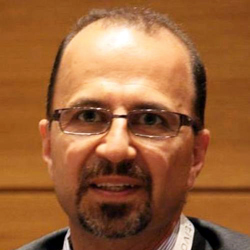Giorgio Giacinto
- Università di Cagliari
- https://www.unica.it/unica/
Ingannati dagli algoritmi, Algoritmi tratti in inganno
 Giorgio Giacinto è Professore Ordinario di Ingegneria Informatica presso l'Università degli Studi di Cagliari, dal 1995 fa parte del gruppo di ricerca sul Pattern Riconoscimento e le sue conoscenze (PRA Lab) del Dipartimento di Ingegneria Elettrica ed Elettronica (DIEE) dell'Universita 'di Cagliari (http://pralab.diee.unica.it). E 'coordinatore del corso di Laurea Magistrale in Ingegneria Informatica, Cybersecurity e Intelligenza Artificiale.
La sua attività di ricerca si svolge principalmente attraverso il Pattern Recognition e Machine Learning per la Sicurezza Informatica, sviluppando strumenti per la sicurezza e classificazione di attacchi web, e per la precisione e classificazione di malware, con particolare attenzione al tema dell'adversarial apprendimento, finalizzato a studiare la sicurezza degli algoritmi di machine learning.
Partecipa, come coordinatore o esperto scientifico, progetti di ricerca di base e industriali finanziati in ambito nazionale e internazionale. È co-fondatore dello spin-off accademico "Pluribus One" (https://www.pluribus-one.it).
Autore di più di 150 pubblicazioni scientifiche su riviste e atti di congresso a livello internazionale, è Senior Member delle associazioni IEEE e ACM.
Ulteriori informazioni alle pagine http://people.unica.it/giorgiogiacinto e http://pralab.diee.unica.it.
Giorgio Giacinto è Professore Ordinario di Ingegneria Informatica presso l'Università degli Studi di Cagliari, dal 1995 fa parte del gruppo di ricerca sul Pattern Riconoscimento e le sue conoscenze (PRA Lab) del Dipartimento di Ingegneria Elettrica ed Elettronica (DIEE) dell'Universita 'di Cagliari (http://pralab.diee.unica.it). E 'coordinatore del corso di Laurea Magistrale in Ingegneria Informatica, Cybersecurity e Intelligenza Artificiale.
La sua attività di ricerca si svolge principalmente attraverso il Pattern Recognition e Machine Learning per la Sicurezza Informatica, sviluppando strumenti per la sicurezza e classificazione di attacchi web, e per la precisione e classificazione di malware, con particolare attenzione al tema dell'adversarial apprendimento, finalizzato a studiare la sicurezza degli algoritmi di machine learning.
Partecipa, come coordinatore o esperto scientifico, progetti di ricerca di base e industriali finanziati in ambito nazionale e internazionale. È co-fondatore dello spin-off accademico "Pluribus One" (https://www.pluribus-one.it).
Autore di più di 150 pubblicazioni scientifiche su riviste e atti di congresso a livello internazionale, è Senior Member delle associazioni IEEE e ACM.
Ulteriori informazioni alle pagine http://people.unica.it/giorgiogiacinto e http://pralab.diee.unica.it.
 Giorgio Giacinto is Full Professor of Computer Engineering at the University of Cagliari, since 1995 he is part of the research group on the Pattern Recognition and his knowledge (PRA Lab) of the Department of Electrical and Electronic Engineering (DIEE) of the University of Cagliari (http://pralab.diee.unica.it). He is the coordinator of the Master's Degree in Computer Engineering, Cybersecurity and Artificial Intelligence.
His research activity is mainly carried out through the Pattern Recognition and Machine Learning for Computer Security, developing tools for the security and classification of web attacks, and for the accuracy and classification of malware, with particular attention to the topic of adversarial learning, aimed at studying the safety of machine learning algorithms.
He participates as a coordinator or scientific expert, in basic and industrial research projects, nationally and internationally funded. He is co-founder of the academic spin-off "Pluribus One" (https://www.pluribus-one.it).
Author of more than 150 scientific publications in journals and conference proceedings at international level, he is a Senior Member of the IEEE and ACM associations.
Further information at http://people.unica.it/giorgiogiacinto and http://pralab.diee.unica.it.
Giorgio Giacinto is Full Professor of Computer Engineering at the University of Cagliari, since 1995 he is part of the research group on the Pattern Recognition and his knowledge (PRA Lab) of the Department of Electrical and Electronic Engineering (DIEE) of the University of Cagliari (http://pralab.diee.unica.it). He is the coordinator of the Master's Degree in Computer Engineering, Cybersecurity and Artificial Intelligence.
His research activity is mainly carried out through the Pattern Recognition and Machine Learning for Computer Security, developing tools for the security and classification of web attacks, and for the accuracy and classification of malware, with particular attention to the topic of adversarial learning, aimed at studying the safety of machine learning algorithms.
He participates as a coordinator or scientific expert, in basic and industrial research projects, nationally and internationally funded. He is co-founder of the academic spin-off "Pluribus One" (https://www.pluribus-one.it).
Author of more than 150 scientific publications in journals and conference proceedings at international level, he is a Senior Member of the IEEE and ACM associations.
Further information at http://people.unica.it/giorgiogiacinto and http://pralab.diee.unica.it.
SESSIONE 3. CYBERSECURITY
Ingannati dagli algoritmi, Algoritmi tratti in inganno
 Un attacco informatico oggi richiede l’utilizzo di tecniche che hanno come primo obiettivo quello di guadagnarsi la fiducia delle persone per accedere ai sistemi che elaborano e memorizzano dati e informazioni. Ottenuto l’accesso ai sistemi, l’obiettivo si sposta nel guadagnarsi la fiducia dei sistemi di difesa. Attacco e difesa condividono gli strumenti di base che fanno sempre maggior uso di tecniche di intelligenza artificiale, ora per produrre sistemi che ingannano, ora per realizzare difese intelligenti che risultano a loro volta ingannabili.
Un attacco informatico oggi richiede l’utilizzo di tecniche che hanno come primo obiettivo quello di guadagnarsi la fiducia delle persone per accedere ai sistemi che elaborano e memorizzano dati e informazioni. Ottenuto l’accesso ai sistemi, l’obiettivo si sposta nel guadagnarsi la fiducia dei sistemi di difesa. Attacco e difesa condividono gli strumenti di base che fanno sempre maggior uso di tecniche di intelligenza artificiale, ora per produrre sistemi che ingannano, ora per realizzare difese intelligenti che risultano a loro volta ingannabili.
 Nowadays, a cyber-attack requires the use of techniques whose primary objective is to earn people's trust in order to access the systems that process and store data and information. Once access to the systems is achieved, the objective moves towards gaining the trust of the defense systems. Attack and defense share the basic tools that increasingly use artificial intelligence techniques, now to produce deceiving systems, now to create intelligent defenses that are themselves deceptive.
Nowadays, a cyber-attack requires the use of techniques whose primary objective is to earn people's trust in order to access the systems that process and store data and information. Once access to the systems is achieved, the objective moves towards gaining the trust of the defense systems. Attack and defense share the basic tools that increasingly use artificial intelligence techniques, now to produce deceiving systems, now to create intelligent defenses that are themselves deceptive.









